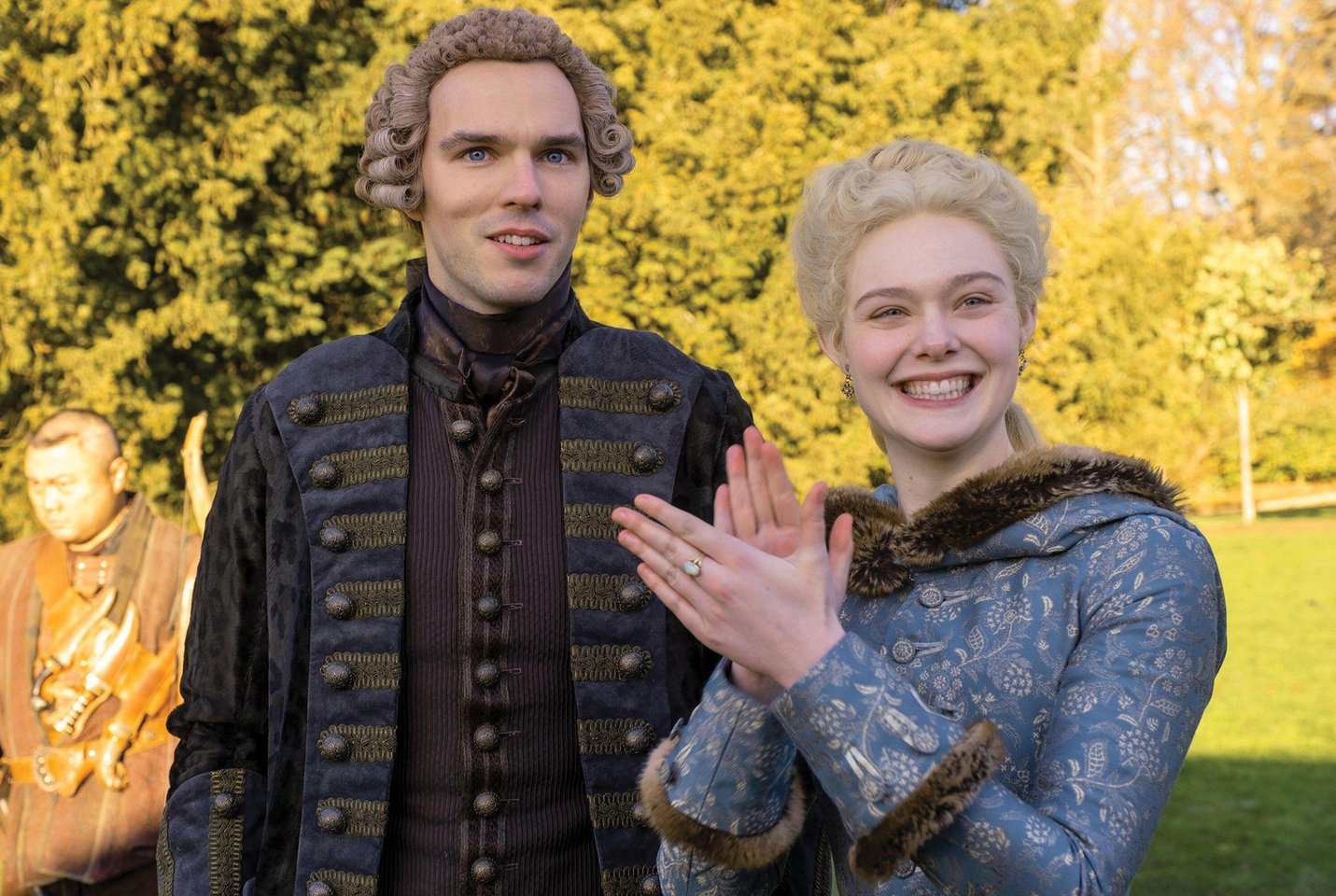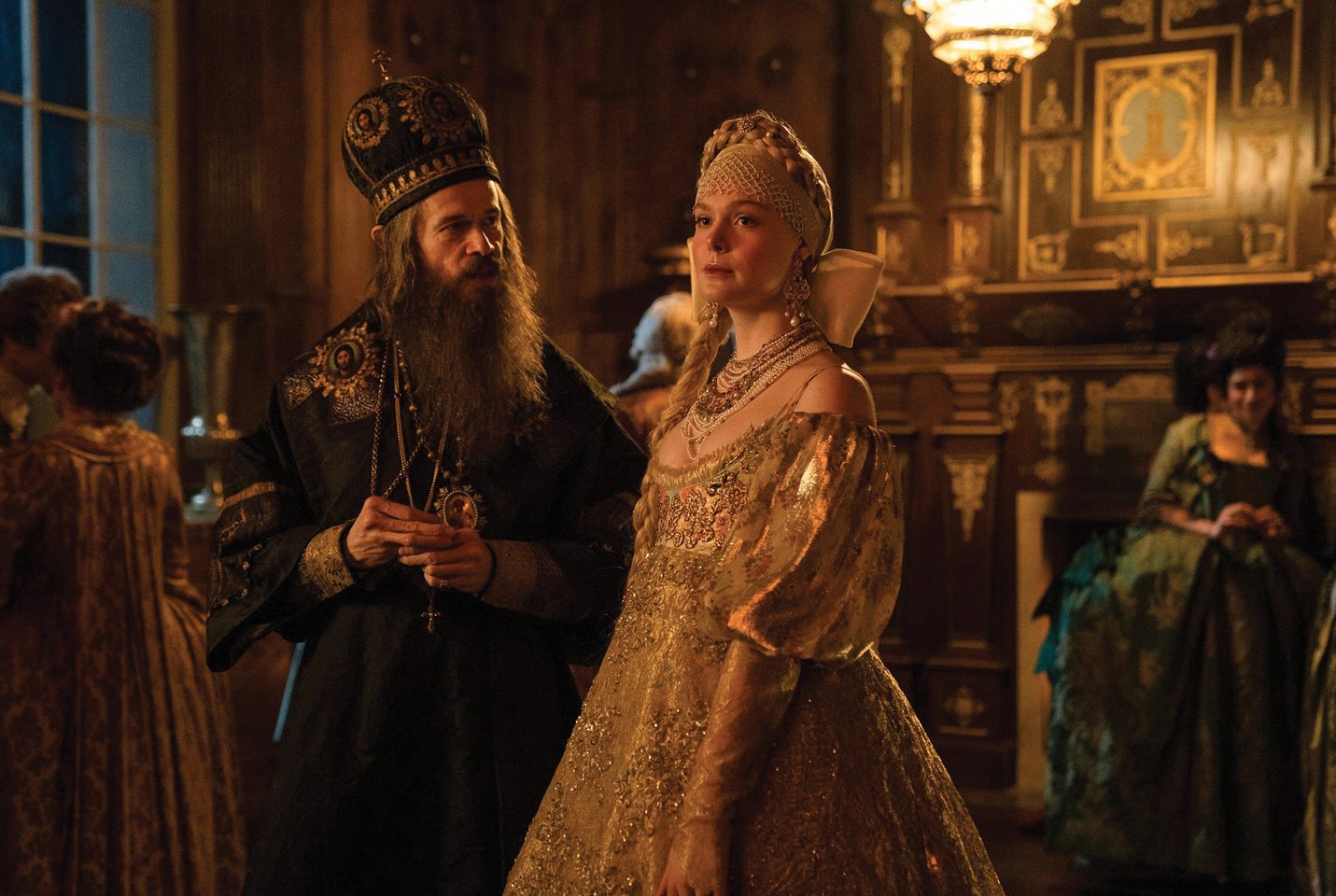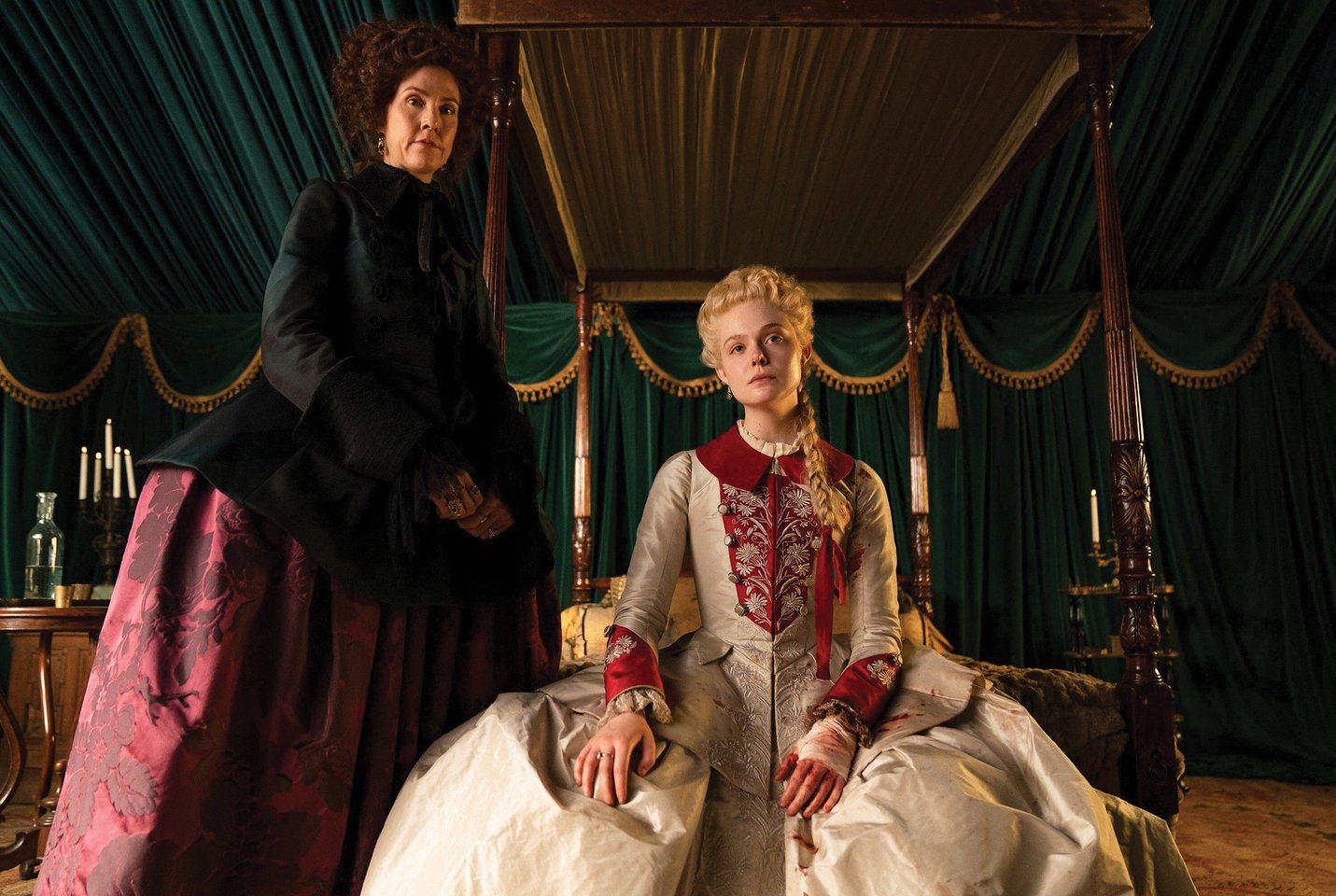“Generals need to be fighting someone, if you do not give them someone to fight, they’ll fight you,” Peter (Nicholas Hoult) tells Grigor (Gwilym Lee) in The Great. At their feet is General Velementov (Douglas Hodge), snoring through a hangover – a consequence of his alcoholism and believing that he’s being excluded from plans Empress Catherine's (Elle Fanning) plans to start a war with the Ottoman Empire.
“That’s very pithy,” Grigor responds, surprised.
“I’m writing new things down all the time. And you thought I wasn’t on my game, Grigor,” Peter brags.
Unlike his diabolically endearing character, Tony McNamara doesn’t write down pithy sayings. Though The Great abounds with terse and hilarious insults (“I look at you and go dry like sand”) and insights (“Most women die with a better unsaid idea in their hearts”), the director and screenwriter adheres to playwright David Williamson’s advice that if dialogue is preconceived, it’ll sound ‘written’.
“[The colourful dialogue] comes out of just writing the story. Sometimes in the writers’ room we’ll think of things that we think are hilarious, but they often don’t make the script because I try to make it very organic,” he explains. “The fun of it is discovering it myself, I don’t know what I’m going to write – you totally get surprised.”
With its abundance of sex, violence and swearing, it’s safe to say The Great surprised viewers when it debuted in 2020, but for fans of Yorgos Lanthimos’ The Favourite – which earned McNamara an Oscar nomination for screenwriting – the show’s uniquely ahistorical tone and cutting conversations shouldn’t be a shock. The acclaimed series takes place in a court of “sallow-faced, acid-tongued moles”, where Catherine and Peter trade barbs, bruises and beds as they grapple for control of 17th-century Russia, and while it seemingly mirrors the themes and powerplays that made The Favourite one of 2018’s biggest films, The Great came first.
While scribing plays for Sydney Theatre Company during Robyn Niven’s creative stewardship, McNamara was asked by the legendary performer to write her a role. “I didn’t want to write a contemporary play and I was trying to find a character that would have the scale I felt like she needed,” McNamara recalls. “Then I just stumbled across Catherine the Great, who I didn’t really know anything about…”
It’s safe to say McNamara knows a thing or two about Catherine the Great now. Though Niven didn’t end up playing her, Catherine stayed with him for over a decade and the play helped establish his signature approach to playing “fast and loose” with historical dramas. In a profile on Robin McLeavy, who did play Catherine on stage, the production is described as “a racy re-imagining of her rise and her reign” and Catherine’s famous hedonism “is one reason why McNamara’s new work is no dusty history lesson”.

“There was something in the character I really loved, there was something in the style I really loved. There was something about doing that to a period piece that really seemed to work,” McNamara says. “As a writer, it felt like you got to do anything. It gave you a lot of scope for drama, for life and death, but it could also be ridiculous.”
Originally The Great was going to be a film. Yorgos Lanthimos came across the script and hired McNamara to work on Deborah Davis’ screenplay for The Favourite. Though he loved the story of the personal and political machinations in Queen Anne’s court, the singular, idiosyncratic director wanted a tone that was different, dark and funny.
“I totally understood. We just have a very similar way of viewing the world – we’re very simpatico in what we think is funny – we like dark stuff, we like things that are cruel, so we have a similar approach to character, script and story,” McNamara explains.
And it was during rehearsals on The Favourite when McNamara met Nicholas Hoult that he found The Great’s funny and cruel Peter III. The two hit it off, and Hoult agreed to return to TV, which he hadn’t done since Skins. “He felt really good doing my material. During rehearsals I was thinking, ‘Who can be Peter and get away with it in the same way?’ Also, like ‘Who can be Catherine and be this person who carries a dramatic narrative story, that’s actually a comedy’?”
Unlike Hoult, Elle Fanning had never starred in a TV series. She did have 20 years’ on-screen experience though, despite being only 23. After making her debut playing the younger version of her sister Dakota in I Am Sam (2001), Fanning has worked with the likes of JJ Abrams, Sofia Coppola, Nicolas Winding Refn and Sally Potter – and that experience is integral to the success of The Great both on screen and behind the scenes.
“She’s such a good dramatic actor and I’d seen her in very serious parts, but she also so funny and full of life and fearless, as soon as you meet her, you know this is a person who’s not scared of anything.”

While his two stars both have an “unbelievable work ethic”, as the title character, Fanning has an enormous amount of words to memorise and perform. Days are 14 hours long and sometimes she’s learning five to six pages a night afterwards, but as an executive producer, she has another role to play – she’s a “real partner” to McNamara as a showrunner. “I rely on her to know the temperature of the show…. She can read a set and calm me down,” he says. “She brings a love of the show that’s infectious to everyone.”
And then there’s the creative input. It’s Catherine’s birthday in the season one finale; it’s also the day she’s decided to kill her husband. To celebrate, Catherine dresses in a hot pink birthday dress, which is slightly absurd and also incredibly fitting during the bloody coup that follows the celebrations. This anachronistic emblem of electric femininity was Fanning’s idea.
While it’s unlikely the contemporary cut and colour featured in the real Catherine the Great’s wardrobe, and not that the show adheres much to historical accuracy, some of the best parts are (somewhat) authentic. For instance, a running gag is Catherine peeing on bales of wheat that should change colour if she’s pregnant – apparently a real pregnancy test from the period that actually works. But before pregnancy, there’s usually sex and there’s a lot in The Great, which is also historically accurate, as McNamara points out: “Catherine the Great is famous for her sexuality and she was unapologetic about it.”
While women suffer the casual misogyny of men in the court, they’re just as unruly, debauched and lustful. When Peter and Grigor agree that Peter can only sleep with Grigor’s wife Georgina twice a year, she snorts, “I shall fuck who I want, when I want.”
“Sex functions in all different ways – sometimes it’s pleasure, sometimes it’s power, sometimes it’s love and sometimes it’s just boredom,” McNamara says.

Perhaps it goes back to working on The Secret Life of Us, but one intriguing approach to the show McNamara and the writers’ room take is to think about the palace as a giant apartment building. “Except you’re trapped and you’ve got nothing but alcohol and guns and sex – those are your options for what you do in a day.”
It’s a chaotic cocktail that plays out deliciously on screen and resists the traditional period pieces Hollywood usually rolls out. In one episode, Catherine ingests a lavender powder that has the effects of amphetamines. According to McNamara, “The standard period drama erases a lot of this stuff and makes it all polite when there was a lot of chaos and experimentation.” In another episode, Catherine takes mushrooms to see God, and this intersection of science and ritual serves as one of the show’s key narrative tensions – tradition (represented by the church and court) versus progress (represented by Catherine and the enlightenment ideas she introduces to Russia) – themes that continue to resonate in our society, despite the story being set over two hundred years ago.
But it’s not the sex or violence that drives the show – it’s the characters who propel the sensation and spectacle. As McNamara points out: “I’m interested in characters who are complicated and less than perfect, who want what they want and will possibly go too far to get it.”
In season one, that seems to be Peter, but by season two, all the qualities that Catherine has that made her a foil for his malicious debauchery become her flaws. “That’s what I like about her as a character – her heart’s so in the right place and what she wants to do is right but her ability to do it is limited by what helps make her Empress [in season one] – her confidence and delusional optimism – they become her flaws when it all flips.”
You can see this approach to character in McNamara’s other works, whether it’s The Favourite or Cruella, the latter of which he’s currently working on the sequel of, alongside another two projects with Yorgos Lanthimos. The next, Poor Things, reunites Lanthimos and McNamara with The Favourite star Emma Stone in a Victorian-era tale inspired by Frankenstein.
And to that, we say Huzzah!
See costumes, sketches and mood boards from season one and two of The Great in our centrepiece exhibition, The Story of the Moving Image.

